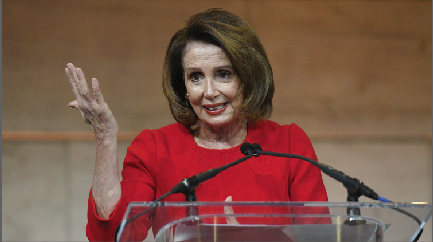Not too fast, not too slow — just right. Therein lies the difficult calculus Democrats in the House of Representatives will be charged with in the coming weeks as they judge how to proceed with an impeachment inquiry into President Donald Trump’s dealings with the president of Ukraine.
And proceed they must. Like many other Democrats, I thought Speaker of the House Nancy Pelosi took the right step when she ended months of internal party debate and opened an impeachment inquiry, but now, there are serious practical questions about what to do next. If Democrats overplay their hand, there is a real risk that Trump will leverage the impeachment fight to his electoral advantage.
One of the most pressing practical questions is about speed. If Democrats move too fast, they risk not looking deliberate, serious or thorough enough. They would also close off the possibility that modestly broadening the inquiry beyond the Ukraine dealings might help them strengthen the case against Trump by making clear the extent and depth of his malfeasance. There are plenty of hints in the air that the shenanigans with Ukraine were not a one-time shattering of norms, but rather part of a norm-shattering body of work.
On the other hand, the closer we draw to the election in November 2020, the more Trump’s apologists will allege that the inquiry is politically motivated and undemocratic. Never mind that the genuinely undemocratic acts here were all committed by the man who now owns their party.
House Democrats seem to be answering this conundrum by coalescing behind a strategy of narrowly focusing their impeachment inquiry on the latest explosive revelations involving Trump’s corrupt pressure on the president of Ukraine to investigate a domestic political rival and thereby interfere in a U.S. election on his behalf.
The beauty of this strategy is the stunningly straightforward nature of the Ukraine affair. Whereas the Mueller report discussed Trump surrogates dealing with Russians and an obtuse web of interactions, the revelations in the whistleblower complaint are clear as a bell. By his own admission, and backed up by both the quasi-transcript released by the White House and the whistleblower complaint, the president abused the power of his office by pressuring a foreign government to aid him in re-election. Unlike with the Mueller report, it doesn’t take the patience to parse through a 448-page document to understand that is absolutely something presidents should not do.
As a result of this clarity, the Ukraine affair has already generated a sea change in public opinion that the Mueller report was never able to, and as a consequence, impeachment is slowly nearing the realm of political possibility. Thus, by my judgment, Pelosi’s signal that Democrats will keep the inquiry focused on Ukraine is the right strategy, but preserving the simplicity of their messaging will require real discipline from the party at large — especially since there is pent-up desire among many to hold Trump accountable for all sorts of wrongdoing he has allegedly committed as president.
Of course, the president has committed previous offenses that would have justified an impeachment inquiry months, if not years ago, before the Mueller report even saw the light of day. Various House committees are still investigating other matters that future articles of impeachment could theoretically sweep in — obstruction of justice, Trump’s endless emoluments clause violations and egregious self-enrichment off the presidency, for instance. To borrow from David Foster Wallace, these are the waters we swim in.
Those committees can and should contemporaneously continue those investigations while the impeachment inquiry is ongoing. But that does not mean that future articles of impeachment should be broadened. The best path to an impeachment process that successfully punishes Trump will be one in which Democrats have the easiest argument to make and Republicans have the hardest. It’s for all these reasons that Democrats have to be so disciplined in how they prosecute this affair. They need to write rock-solid, specific, unassailable articles of impeachment and will need to have a single leading spokesman, who — as a practical matter — will be House Intelligence Committee Rep. Adam Schiff. Everyone else will need to take a back seat. They need to keep the focus on the nonpolitical witnesses and they need to have their presidential candidates stay out of this impeachment story and concentrate on their ideas for reviving and reuniting America. Only then will they be able to make Republicans really squirm.
Some Trump sycophants, such as Sen. Lindsey Graham (R-SC), have asserted that no criminal statute prevents a president from soliciting foreign interference in American elections. But the Constitution is clear that the impeachment process is not a criminal trial, and as such does not require the commission of a crime “beyond a reasonable doubt.” In fact, the absence of a criminal statute to restrain this sort of abuse of authority only reinforces the need for Congress to act in accordance with the aims of the Framers of the Constitution. As Alexander Hamilton wrote in Federalist No. 65, impeachment was a just response not only to crimes but also to acts that were an “abuse or violation of some public trust.”
Since the first day of this administration, we have all been reminded of the extent to which most past presidents were constrained not by specific laws but by principles, character and a deep reverence for the Framers’ intent in the Constitution. To our sorrow, we have also discovered that Trump is immune to such considerations. Those who still love and admire this country recognize the fierce urgency to assert that his degradation of the institutions of American governance is intolerable. But that will only be realized with clear-eyed focus and deliberate speed.















